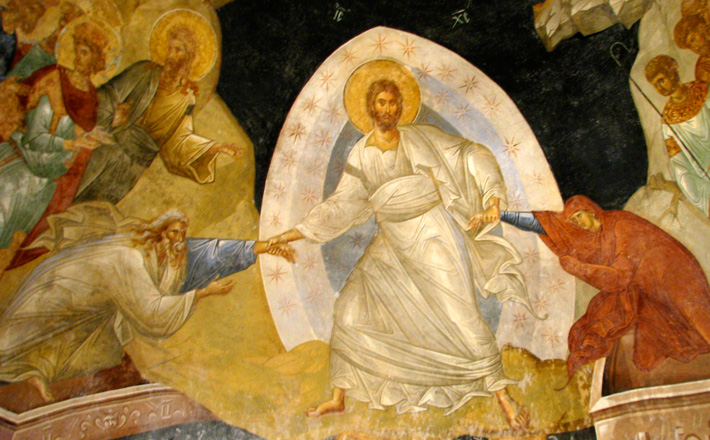Commentary on Psalm 17:1-9
Praying with exclamation points!
Before entering into Psalm 17 to consider David’s prayer, we are going to take a detour through the Gospel of Luke to talk about how Jesus instructs his disciples to pray. In Luke 11 when one of the disciples says, “Lord, teach us to pray, as John taught his disciples,” Jesus has a ready answer, “When you pray, say: Father in heaven … ” What follows, of course, is what we now call The Lord’s Prayer. We are so accustomed to praying this prayer that sometimes it’s easy to overlook how edgy it is. This is not a polite please-and-thank-you prayer, an impartial prayer from a safe distance, or even a groveling I-promise-to-be good kind of prayer. It’s bold. It’s confident. And it’s packed with direct commands.
In Luke’s (as compared to Matthew’s) version, not just one or two, but seven imperatives roll off the tongue in quick succession, beginning with the disciple who uses an imperative to say “Lord, TEACH us to pray … ” Jesus’ response is just as direct: “When you pray, SAY … ” Grammatically, imperatives can be used when someone in a position of more power is speaking to someone of lesser power or status, or, as in the case of Luke 11, between those who know each other well and who have a relationship that allows for this kind of intimacy. In general, imperatives (rather than other forms of direct speech) are used to express urgency and the need for quick action or response while conveying a sense of clear and unwavering purpose. “Just do it!” the sweating athlete in Nike commercials tells you, as you sit on your couch. “Just do it!” I say to my teenage son when it’s his turn to do the dishes. Don’t think about it, don’t question it, don’t put it off: get it done, NOW!
This same sense of familiarity, urgency and clarity runs through the Lord’s prayer, the imperatives providing the quick, intense beat that holds the prayer together. Stripping the prayer down to its bones, you get something like this:
O FATHER!
Your name, MAKE IT HOLY!
Your kingdom, BRING IT ON!
GIVE us bread TODAY!
FORGIVE us our sins,
As we forgive those who sin against us.
DO NOT TEST us.
[Matthew adds] And PROTECT us from evil.
This is the prayer of people who know the one to whom they are praying, who know who they are and what they need, and who know that God is the only one who can make it all happen.
This is the prayer of a people who stand looking toward heaven, with hands outstretched, and shouting the words at the top of their lungs. But this isn’t usually the way we pray. We bow our heads, close our eyes, and utter the words so softly and indistinctly that it’s hard to make them out.
We have tamed a wild prayer.
Now, returning to David’s prayer in Psalm 17, it becomes apparent that Jesus was teaching us to pray in his ancestral tradition which was filled with wild prayer. Psalm 17 is infused with the same sense of intimacy, confidence, boldness, purpose, and urgency that Jesus models for his disciples in the Lord’s Prayer. Robert Alter’s new translation of the psalm brings out these qualities in a fresh way, both visually and orally (emphasis mine).1
1 Hear, O Lord, a just thing.
Listen well to my song.
Hearken to my guileless prayer.
2 From before You my judgment will come.
Your eyes behold rightness.
3 You have probed my heart, come upon me by night,
You have tried me, and found no wrong in me.
I have barred my mouth to let nothing pass.
4 As for human acts — by the word of Your lips!
I have kept from the tracks of the brute.
5 Set firm my steps on Your pathways,
so my feet will not stumble.
6 I called You, for You will answer me, God.
Incline Your ear, O hear my utterance.
7 Make Your mercies abound, O rescuer of those who shelter
from foes at Your right hand.
8 Guard me like apple of the eye,
in the shadow of Your wings conceal me
9 from the wicked who have despoiled me,
my deadly enemies drawn round me.
David does not begin with questions — “Lord? Are You there?” — or apologies — “Sorry to bother you, God, but…” No, he addresses God with a string of imperatives — “Hear!”, “Listen!”, and “Hearken!” He is convinced that what he has to say is worthwhile (“a just thing” and a “guileless prayer”) and insists that God should pay attention.
David is also confident that he is someone worth listening to, stating
You have probed my heart, come upon me by night,
You have tried me, and found no wrong in me.
I have barred my mouth to let nothing pass.
This might cross the line from confidence to arrogance, but David doesn’t take all the credit for his righteous behavior. Throughout the psalm he seems to clearly understand that God is ultimately the one to whom credit is due, noting that “From before you my judgment will come … ” and demanding ongoing assistance “Set firm my steps on Your pathways, so my feet will not stumble.”
After demanding God’s attention and making his case, David states that regardless of the circumstances, he calls on God because he knows with certainty that, “You will answer me, God.” And then he returns to where he began in vs. 1 by telling God, once again: “Incline your ear, and “hear my utterance!”
In the midst of crisis, having finally secured God’s ear, David’s imperatives transition to the very specific actions that he wants God to perform. This time, though, his demands are woven through with striking and memorable imagery: “Make Your mercies abound, O rescuer of those who shelter from foes,” “Guard me like the apple of the eye,” and “In the shadow of Your wings conceal me.”
In Psalm 17, David knows the one to whom he is praying, he knows who he is and what he needs, and he knows that God is the only one who can make it all happen.
How can we pray like David? How can we pray wild, untamed prayers with boldness, clarity, and with full confidence that God listens and acts?
Notes:
1 Alter, Robert. The Book of Psalms: A Translation with Commentary. New York: W.W. Norton, 2007. Print.


November 6, 2016